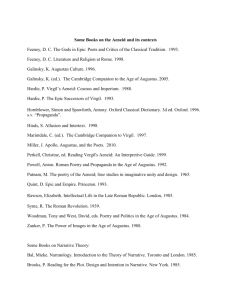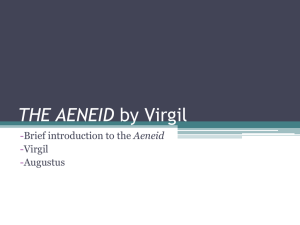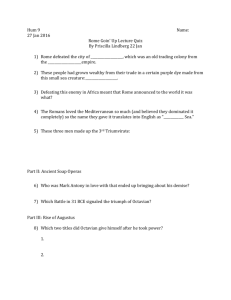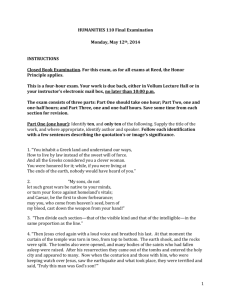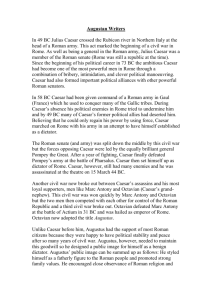WHY VIRGIL WROTE THE AENEID
advertisement
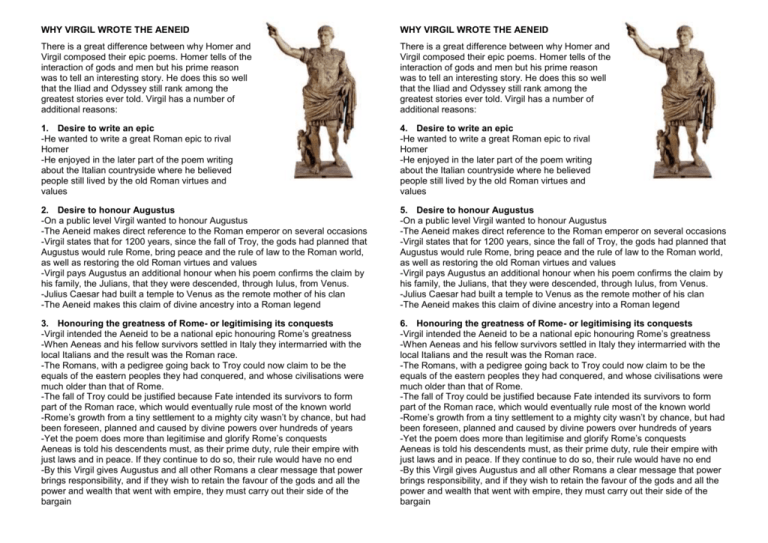
WHY VIRGIL WROTE THE AENEID WHY VIRGIL WROTE THE AENEID There is a great difference between why Homer and Virgil composed their epic poems. Homer tells of the interaction of gods and men but his prime reason was to tell an interesting story. He does this so well that the Iliad and Odyssey still rank among the greatest stories ever told. Virgil has a number of additional reasons: There is a great difference between why Homer and Virgil composed their epic poems. Homer tells of the interaction of gods and men but his prime reason was to tell an interesting story. He does this so well that the Iliad and Odyssey still rank among the greatest stories ever told. Virgil has a number of additional reasons: 1. Desire to write an epic -He wanted to write a great Roman epic to rival Homer -He enjoyed in the later part of the poem writing about the Italian countryside where he believed people still lived by the old Roman virtues and values 4. Desire to write an epic -He wanted to write a great Roman epic to rival Homer -He enjoyed in the later part of the poem writing about the Italian countryside where he believed people still lived by the old Roman virtues and values 2. Desire to honour Augustus -On a public level Virgil wanted to honour Augustus -The Aeneid makes direct reference to the Roman emperor on several occasions -Virgil states that for 1200 years, since the fall of Troy, the gods had planned that Augustus would rule Rome, bring peace and the rule of law to the Roman world, as well as restoring the old Roman virtues and values -Virgil pays Augustus an additional honour when his poem confirms the claim by his family, the Julians, that they were descended, through Iulus, from Venus. -Julius Caesar had built a temple to Venus as the remote mother of his clan -The Aeneid makes this claim of divine ancestry into a Roman legend 5. Desire to honour Augustus -On a public level Virgil wanted to honour Augustus -The Aeneid makes direct reference to the Roman emperor on several occasions -Virgil states that for 1200 years, since the fall of Troy, the gods had planned that Augustus would rule Rome, bring peace and the rule of law to the Roman world, as well as restoring the old Roman virtues and values -Virgil pays Augustus an additional honour when his poem confirms the claim by his family, the Julians, that they were descended, through Iulus, from Venus. -Julius Caesar had built a temple to Venus as the remote mother of his clan -The Aeneid makes this claim of divine ancestry into a Roman legend 3. Honouring the greatness of Rome- or legitimising its conquests -Virgil intended the Aeneid to be a national epic honouring Rome’s greatness -When Aeneas and his fellow survivors settled in Italy they intermarried with the local Italians and the result was the Roman race. -The Romans, with a pedigree going back to Troy could now claim to be the equals of the eastern peoples they had conquered, and whose civilisations were much older than that of Rome. -The fall of Troy could be justified because Fate intended its survivors to form part of the Roman race, which would eventually rule most of the known world -Rome’s growth from a tiny settlement to a mighty city wasn’t by chance, but had been foreseen, planned and caused by divine powers over hundreds of years -Yet the poem does more than legitimise and glorify Rome’s conquests Aeneas is told his descendents must, as their prime duty, rule their empire with just laws and in peace. If they continue to do so, their rule would have no end -By this Virgil gives Augustus and all other Romans a clear message that power brings responsibility, and if they wish to retain the favour of the gods and all the power and wealth that went with empire, they must carry out their side of the bargain 6. Honouring the greatness of Rome- or legitimising its conquests -Virgil intended the Aeneid to be a national epic honouring Rome’s greatness -When Aeneas and his fellow survivors settled in Italy they intermarried with the local Italians and the result was the Roman race. -The Romans, with a pedigree going back to Troy could now claim to be the equals of the eastern peoples they had conquered, and whose civilisations were much older than that of Rome. -The fall of Troy could be justified because Fate intended its survivors to form part of the Roman race, which would eventually rule most of the known world -Rome’s growth from a tiny settlement to a mighty city wasn’t by chance, but had been foreseen, planned and caused by divine powers over hundreds of years -Yet the poem does more than legitimise and glorify Rome’s conquests Aeneas is told his descendents must, as their prime duty, rule their empire with just laws and in peace. If they continue to do so, their rule would have no end -By this Virgil gives Augustus and all other Romans a clear message that power brings responsibility, and if they wish to retain the favour of the gods and all the power and wealth that went with empire, they must carry out their side of the bargain
